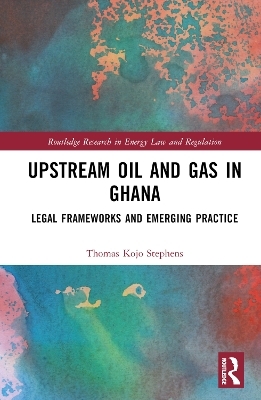
Upstream Oil and Gas in Ghana
Routledge (Verlag)
978-1-032-46267-7 (ISBN)
Focusing on Ghana as an emerging petroleum country, Thomas Kojo Stephens begins by examining whether the existing constitutional framework will be effective in governing the expanding oil and gas sector. Drawing on various approaches proffered by other experts in the field, Stephens looks at possible institutional structures that could be put in place and juxtaposes these ideas with the experience of Ghana to test the efficacy of these proposals. He also explores the types of contractual frameworks currently implemented in Ghana for comparison with other emerging petroleum economies, examining the barriers to effectiveness, novel provisions that must be incorporated, and lessons learned from other regions. Finally, the book highlights how vital it is for the Ghanaian State to monitor the use of petroleum revenue and make ethical investment decisions that prioritize the interests of Ghanaian citizens.
Upstream Oil and Gas in Ghana will be of great interest to students and scholars of energy law and policy, oil and gas management, and African Studies more broadly, as well as those working in the upstream petroleum industry.
Thomas Kojo Stephens is a Senior Lecturer at the University of Ghana School of Law and lectures in both the LLB and LLM Programs, lecturing among others, Conflict of Laws/Private International Law, Research Methodology, Energy Law, and Natural Resources Law, and supervises in the PhD Program. He is a Senior Partner at Stobe Law and the Head of the Transactional, Energy Practice, as well as the Consultancy Group of the firm. He advises numerous entities in the petroleum sector and serves as principal consultant for a number of high-profile entities. He is the jurisdictional author for a number of international publications in Petroleum Law and has written on different facets of the industry. He is an Advisory Board Member of the International Energy Law Advisory Group (IELAG), a Principal Trainer at the International Energy Law Training and Research Center (IELTRC), and was a Vice-Chairman of Ghana’s Public Interest and Accountability Committee (PIAC) from 2018 to 2020, a statutory body with oversight over the use of Ghana’s petroleum revenue.
Contents
Acknowledgments
List of Acronyms and Abbreviations
INTRODUCTION
Overview
PART I: CONSTITUTIONAL, STATUTORY AND ORGANIZATIONAL
FRAMEWORKS FOR THE REGULATION OF GHANA’S UPSTREAM
PETROLEUM INDUSTRY
Chapter 1 – GHANA’S UPSTREAM PETROLEUM INDUSTRY
1.0 Introduction
1.1 Ghana’s Sedimentary Basins
1.2 Pre-Commercial Discovery
1.3 Post-Commercial Discovery
Chapter 2: CONSTITUTIONAL FRAMEWORK FOR THE
REGULATION OF GHANA’S PETROLEUM INDUSTRY
2.0 Introduction
2.1 Natural Resources: Background to Ghana’s Constitutional
Framework after Independence (Republican Era)
2.2 The Transpositions to the 1992 Constitution
2.3 The 1992 Constitution
2.4 Conclusion
Chapter 3: STATUTORY FRAMEWORK FOR THE
REGULATION OF GHANA’S PETROLEUM INDUSTRY
3.0 Introduction
3.1 Overview of Statutory Framework of Ghana’s Upstream Petroleum Industry
3.2 Ghana’s Statutory Framework for the Petroleum Industry – Pre-Commercial
Discovery
3.3 Ghana’s Statutory Framework for the Petroleum Industry – Post-Commercial
Discovery
3.4 Evolution of the Current Legislative Framework for the Regulation of
Petroleum Operations – Post-Commercial Discovery
3.5 Approach to Development of Legislation for the Regulation of Petroleum
Operations
3.6 The Petroleum (Exploration and Production) Bill, 2010
3.7 Major Defect in the Petroleum (Exploration and Production) Bill, 2010
3.8 ‘Death’ of the Petroleum (Exploration and Production) Bill, 2010
3.9 The Petroleum (Exploration and Production) Bill, 2013
3.10 The Petroleum (Exploration and Production) Bill, 2014.
3.11 The Petroleum (Exploration and Production) Bill, 2016
3.12 Petroleum (Exploration and Production) Act, 2016 (Act 919).
3.13 Conclusion
Chapter 4: ORGANIZATIONAL FRAMEWORK FOR THE
REGULATION OF GHANA’S PETROLEUM INDUSTRY
4.0 Introduction
4.1 Approaches to Organizational Framework for Regulation
4.2 The Organizational Structure of Ghana’s Upstream Petroleum Industry
4.3 Establishment of the Petroleum Commission
4.4 The Petroleum Commission Act, 2011 (Act 821)
4.5 Ghana National Gas Company
PART II: THE CONTRACTUAL FRAMEWORK FOR THE
REGULATION OF GHANA’S UPSTREAM PETROLEUM INDUSTRY
Chapter 5: LICENSING
5.0 Introduction
5.1 Licensing in Ghana Pre-2016
5.2 Some Events that Precipitated a Desire to Move to the Competitive
Bidding System
5.3 Licensing in Ghana Post 2016 - Competitive Bidding
5.4 Conclusion
Chapter 6: THE CONTRACTUAL FRAMEWORK FOR THE REGULATION OF GHANA'S PETROLEUM INDUSTRY
6.0 Introduction
6.1 The Model Petroleum Agreement
6.2 Petroleum Costs
6.3 Conclusion
PART III: PETROLEUM REVENUE MANAGEMENT FRAMEWORK,
DEVELOPMENTS, AND EVOLVING MATTERS IN THE INDUSTRY
Chapter 7: PETROLEUM REVENUE MANAGEMENT IN GHANA
7.0 Overview
7.1 Sources of Petroleum Revenue
7.2 The Petroleum Holding Fund
7.3 Earmarked Locations for Distribution of Funds
7.4 Summary of the Disbursement of the Revenue as Prescribed by the PRMA
7.5 The Petroleum Wealth Fund (PWF)
7.6 Institutions under the Framework of the PRMA
7.7 Challenges with Petroleum Revenue Management in Ghana
7.8 Conclusion
Chapter 8: EVOLVING MATTERS AND CONCLUDING OVERVIEW
8.0 Introduction
8.1 The Energy Transition: Global Developments and the Impact on Ghana
8.2 Proposed Efforts to Counteract Adverse Impact of Global Developments
arising from the Energy Transition
8.3 Concluding Review
Index
| Erscheinungsdatum | 28.04.2023 |
|---|---|
| Reihe/Serie | Routledge Research in Energy Law and Regulation |
| Zusatzinfo | 4 Tables, black and white; 19 Line drawings, black and white; 4 Halftones, black and white; 23 Illustrations, black and white |
| Verlagsort | London |
| Sprache | englisch |
| Maße | 156 x 234 mm |
| Gewicht | 857 g |
| Themenwelt | Naturwissenschaften ► Geowissenschaften ► Geografie / Kartografie |
| Recht / Steuern ► EU / Internationales Recht | |
| Recht / Steuern ► Öffentliches Recht ► Umweltrecht | |
| Sozialwissenschaften ► Soziologie ► Spezielle Soziologien | |
| Technik ► Elektrotechnik / Energietechnik | |
| ISBN-10 | 1-032-46267-1 / 1032462671 |
| ISBN-13 | 978-1-032-46267-7 / 9781032462677 |
| Zustand | Neuware |
| Informationen gemäß Produktsicherheitsverordnung (GPSR) | |
| Haben Sie eine Frage zum Produkt? |
aus dem Bereich


